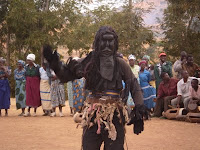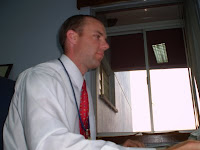Just another day in paradise...
But this weekend changed everything and I went ahead and took the plunge. Seriously, how could you look at this sunset and not fall in love?
 To be honest, Malawi is an easy country to like, but a hard country to love. There are so many endearing things about it, but several things that prevent you from really making a commitment to it. For instance, life in Lilongwe is incredibly boring. There’s really nothing to do, and it gets so dark here so early that the only option really is to sit inside your house and wait for the hours to pass by. You can really go through life here just spinning your wheels. And that’s basically what I’ve been doing except for some fleeting moments out on the road or in a village that I really enjoyed. But without a car, I’ve really become immobile which is not something I enjoy.
To be honest, Malawi is an easy country to like, but a hard country to love. There are so many endearing things about it, but several things that prevent you from really making a commitment to it. For instance, life in Lilongwe is incredibly boring. There’s really nothing to do, and it gets so dark here so early that the only option really is to sit inside your house and wait for the hours to pass by. You can really go through life here just spinning your wheels. And that’s basically what I’ve been doing except for some fleeting moments out on the road or in a village that I really enjoyed. But without a car, I’ve really become immobile which is not something I enjoy.This weekend, however, my friend Stephanie blew into town after a summer in Rwanda and gave me the impetus to rent a car and hit the open road. We ended up spending three straight days sitting on the beach in Lake Malawi just watching the tide roll in and the sun cross the sky. It was somewhere in the middle of that weekend that I realized my true calling – I am destined to build a guest house slash restaurant on a strip of land bordering some body of water. I can just see it now. I’ll wear flip flops and khaki shorts everyday. On Fridays and Saturdays I’ll get my guitar out and play Jimmy Buffett, Bob Marley, and Jack Johnson songs for the world travelers that will constantly be crossing through and staying for the night. I’ll even make Lonely Planet. It’ll say something like “When you stay at Cape Maclear, be sure to ask around with the locals to see if Texas Mike will be on stage tonight. The atmosphere is copasetic and the desserts are divine.” The restaurant will be stocked with some of my favorite goodies, including my favorite recipes, courtesy of my grandmother and Susie Webb.
Ok, maybe I won’t do that everyday. Maybe a more likely scenario is that I’ll take a development job in some big city in Africa. Then on the weekends I’ll escape to my little tropical oasis to feed my soul on warm sunsets and cool drinks. Of course you’ll all be invited to spend a day or a week or a month in paradise. Just bring back some news from the outside world and maybe some Dr. Pepper and I’ll let you stay for free.
The thing that I’ll take the most from the weekend, besides the sunburn and the life calling, is the incredible little village we found. We were in a little town on the Lake called Cape Maclear and it’s the only place where I found a tourist industry in Malawi. Most of Malawi is way off the beaten path for white people. As a result, Malawians don’t have much incentive to cater to white people’s tastes. In the big cities there’s a service industry that has sprung up in the form of security guards, gardeners, and restaurants. But not much in the way of the typical tourist things like curios, guides, etc. But Cape Maclear is the one place where enough white people congregate on a regular enough basis to actually support the entire Malawian population there. It was great to see some kind of industry available to the locals. Malawians are extremely industrious, but in most areas there is just not much for them to do in terms of commerce. It’s frustrating. Unfortunately there still aren’t enough tourists at Cape Maclear and too many Malawians. We paid for one Malawian named Elliot to make us some Banana Pancakes on the beach on Sunday morning. He said that there were about 50 other such cooks all competing for the few tourists strolling up and down the beach.
So the bad part about Cape Maclear is that we were constantly being asked by everyone to let them cook us a fish dinner on the beach, or rent a kayak or snorkeling gear, or guide us through the forest reserve. The cool part is that it is one of the only tourist places I’ve ever been in which all the local housing is literally interspersed amongst all the tourist places. So we literally lived among them for a few days. We all woke up together. They walked right out in front of us sunbathers and bathed in the lake. From our perch on the seat we saw villagers walking up and down with their laundry or the fish they caught. Some of them were going out for the night in dug-out canoes and others were working on a car. There was basically no boundary between the natives and the tourists. That was worth the price of admission itself.
So after all the beach lounging and the conversations with locals and beautiful sunsets how could I not fall for the Warm Heart of Africa? With just under two weeks to go I’m really starting to feel like I’ll miss this place. That wasn’t always the case, but is becoming more and more true with each passing day. I also just recently realized that exactly three weeks from today I’ll find myself in Texas. That’s a complete mindtrip for me. Before that I’ve got a week and a half in Malawi. Then I’ll board a bus for a 30 hour ride which will pass through Mozambique and Zimbabwe on my way to Johannesburg. Then I’ll get onto a sleeper car of a train to Cape Town where I’ll stay for about five days.
With that I’ll leave you with a few of the scenes from around the Lake.







 This past week I had the good fortune of visiting ten primary schools over the course of three days. It was a much needed break from the office, especially for this teacher-turned-development worker. It reminded me that there is life beyond the cubicle if I can just get somebody to pay me to go out and play with kids in Africa. Any takers???
This past week I had the good fortune of visiting ten primary schools over the course of three days. It was a much needed break from the office, especially for this teacher-turned-development worker. It reminded me that there is life beyond the cubicle if I can just get somebody to pay me to go out and play with kids in Africa. Any takers???


 (This guy came and stood about 5 feet away and stared at me long enough for me to get my camera out and snap a picture.)
(This guy came and stood about 5 feet away and stared at me long enough for me to get my camera out and snap a picture.)


